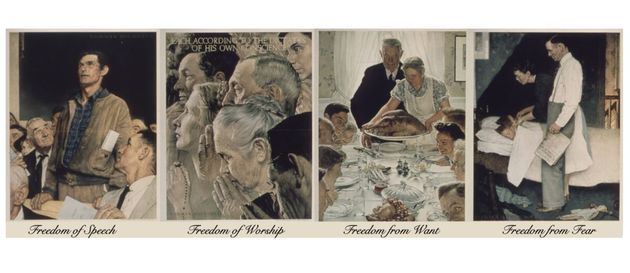The instinct to withdraw into isolationism and nationalism is understandable, yet it plays into the hands of authoritarian, anti-democratic forces.
![Freedoms by Norman Rockwell. / Photo via [link]Weekly Word[/link]](https://cms.evangelicalfocus.com/upload/imagenes/6694e27f0a069_Rockwells940.jpg) Freedoms by Norman Rockwell. / Photo via [link]Weekly Word[/link]
Freedoms by Norman Rockwell. / Photo via [link]Weekly Word[/link]
We Westerners, who have only known the seventy years of peace sustained by the international order ushered in after World War Two, know little of the anxiety and fear Ukrainians and others in war zones experience daily.
Horrific reports of the cruel Russian attacks on the Okhmatdyt children’s hospital in Kyiv just a few days ago, along with other hospitals and civilian targets, sent shock waves through the city, the nation and around the world at the Kremlin’s callous disregard of international law.
For Ira Kapitonova and her family in Kyiv, Russian missiles are scary and they do feel fear and anxiety during air raids or extended blackouts.
Ira wrote how their dinner was interrupted by sirens just days ago and they had to finish their food in the hallway.
Then reading together their daily Bible passage, they drew courage: So have no fear of them, for nothing is covered that will not be revealed, or hidden that will not be known. … And do not fear those who kill the body but cannot kill the soul. Rather fear him who can destroy both soul and body in hell. – Matthew 10:26, 28
Here in the west, the aftermath of elections in the United Kingdom, France and for the European Parliament, a newly inaugurated (far) right-wing government in the Netherlands, and a pending US presidential election between two geriatric candidates, have conspired to create a climate of unpredictability in Europe and abroad… and a measure of fear.
The instinct to withdraw into isolationism and nationalism is understandable. Yet it plays into the hands of authoritarian, anti-democratic forces trying to overthrow the current international order based on global governance, economic stability and collective security.That order was shaped in response to the failure of both Versailles and the League of Nations; the Great Depression; and the violence of World War Two.
Across the Atlantic, Americans have always struggled with a fear that engagement in world affairs would jeopardise their grand experiment.
What prepared them to join the struggling Allies fighting Hitler was not in the first place the Pearl Harbour attack of December 1941.
Eleven months earlier, on January 6, 1941, amidst great global uncertainty and unpredictability, President Franklin Roosevelt gave his famous ‘Four Freedoms’ State of the Union Address to Congress.
While preparing his speech with three close aids in his study, Roosevelt closed his eyes, leaned back in his swivel chair, signalled for silence and, after a long pause, began slowly to dictate a vision of freedom extended throughout the world: ‘four freedoms’ which he believed Americans would be willing to fight for, and if necessary, to die for.
He began:
“We look forward to a world founded upon four essential human freedoms.
“The first is freedom of speech and expression – everywhere in the world.
“The second is freedom of every person to worship God in his (sic) own way – everywhere in the world.
“The third is freedom from want – which, translated into world terms, means economic understandings which will secure to every nation a healthy peace time life for its inhabitants – everywhere in the world.
“The fourth is freedom from fear – which, translated into world terms, means a world-wide reduction of armaments to such a point and in such a thorough fashion that no nation will be in a position to commit an act of physical aggression against any neighbor – anywhere in the world.
“That is no vision of a distant millennium. It is a definite basis for a kind of world attainable in our own time and generation. That kind of world is the very antithesis of the so-called new order of tyranny which the dictators seek to create with the crash of a bomb.
“To that order we oppose the great conception – the moral order. A good society is able to face schemes of world domination and foreign revolutions alike without fear.“
These Four Freedoms became embedded into the Atlantic Charter declared by Winston Churchill and FDR in August 1941; into the United Nations Declaration of January 1, 1942; and into the Universal Declaration of Human Rights adopted by the United Nations in 1948 through the work of Roosevelt’s widow, Eleanor.

[destacate] In this age of populist leaders claiming to defend Judeo-Christian values while undermining democracy from the inside, it’s helpful to ask what sort of leadership results in the freedoms Roosevelt articulated [/destacate] The four freedoms theme inspired illustrator Norman Rockwell to create the paintings above first published on covers of the popular national magazine, The Saturday Evening Post, and later on posters to raise war bonds.
In this age of populist leaders claiming to defend Judeo-Christian values while undermining democracy from the inside, it’s helpful to ask what sort of leadership results in the freedoms Roosevelt articulated.
May God give us leaders committed to see these freedoms extended everywhere in our world!
Jeff Fountain, Director of the Schuman Centre for European Studies. This article was first published on the author's blog, Weekly Word.
[analysis]
[title]One more year[/title]
[photo][/photo]
[text]At Evangelical Focus, we have a sustainability challenge ahead. We invite you to join those across Europe and beyond who are committed with our mission. Together, we will ensure the continuity of Evangelical Focus and Protestante Digital (Spanish) in 2024.
Learn all about our #OneMoreYearEF campaign here (English).
[/text][/analysis]

Las opiniones vertidas por nuestros colaboradores se realizan a nivel personal, pudiendo coincidir o no con la postura de la dirección de Protestante Digital.
Si quieres comentar o